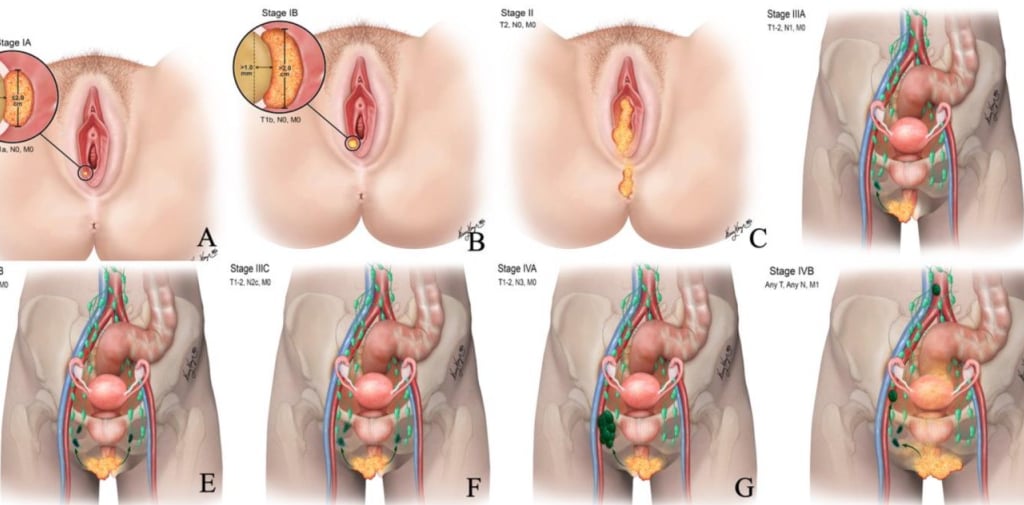Vulvar Cancer: Causes, Symptoms, and Treatment
Learn about causes, symptoms, and treatments for vulvar cancer. Explore effective strategies and important information on managing this condition. #vulvar cancer


Understanding Vulvar Cancer
Vulvar cancer is a type of cancer that affects the vulva, which is the external part of a woman's genitals. It occurs when abnormal cells in the vulva start to grow uncontrollably, forming a tumor. While the exact cause of vulvar cancer is unknown, there are several factors that can increase a woman's risk of developing this condition.
Causes of Vulvar Cancer
There are several risk factors that can contribute to the development of vulvar cancer. These include:
1. Age: Vulvar cancer is more commonly diagnosed in older women, with the majority of cases occurring in women over the age of 50.
2. Human Papillomavirus (HPV) Infection: Certain strains of HPV, a sexually transmitted infection, can increase the risk of vulvar cancer. It is important to note that not all women with HPV will develop vulvar cancer.
3. Smoking: Smoking tobacco has been linked to an increased risk of vulvar cancer. The harmful chemicals in tobacco can damage the DNA in cells, leading to the development of cancer.
4. Chronic Skin Conditions: Certain chronic skin conditions, such as lichen sclerosus or lichen planus, can increase the risk of vulvar cancer. These conditions cause long-term inflammation and irritation of the vulva.
Symptoms of Vulvar Cancer
Vulvar cancer can cause various symptoms, which may include:
1. Persistent Itching: Itching in the vulva that doesn't go away or worsens over time.
2. Pain or Tenderness: Pain or tenderness in the vulva, often accompanied by a lump or thickened area.
3. Abnormal Bleeding: Unusual bleeding, such as bleeding between periods, after sex, or after menopause.
4. Changes in Skin Color or Texture: The skin of the vulva may become thicker, develop a rash-like appearance, or change in color.
5. Open Sores or Ulcers: The presence of open sores or ulcers that do not heal.
It is important to remember that these symptoms can be caused by various conditions, and having one or more of these symptoms does not necessarily mean you have vulvar cancer. However, if you experience any of these symptoms, it is crucial to consult a healthcare professional for a proper evaluation.
Treatment of Vulvar Cancer
The treatment of vulvar cancer depends on various factors, such as the stage of the cancer, the size and location of the tumor, and the overall health of the patient. The main treatment options for vulvar cancer include: 1. Surgery: Surgery is often the primary treatment for vulvar cancer. It involves removing the tumor and a margin of healthy tissue surrounding it. In some cases, lymph nodes in the groin area may also be removed.
2. Radiation Therapy: Radiation therapy uses high-energy X-rays to kill cancer cells. It may be used before surgery to shrink the tumor or after surgery to destroy any remaining cancer cells.
3. Chemotherapy: Chemotherapy involves the use of drugs to kill cancer cells. It may be used in combination with surgery or radiation therapy, especially for advanced cases of vulvar cancer.
4. Immunotherapy: Immunotherapy is a newer treatment option that helps the immune system recognize and destroy cancer cells. It may be used in certain cases of vulvar cancer, particularly those that are caused by HPV. In conclusion, vulvar cancer is a type of cancer that affects the external part of a woman's genitals. While the exact cause is unknown, certain factors can increase the risk of developing this condition. Recognizing the symptoms and seeking prompt medical attention is crucial for early detection and effective treatment. Treatment options typically include surgery, radiation therapy, chemotherapy, and immunotherapy, depending on the individual case.
